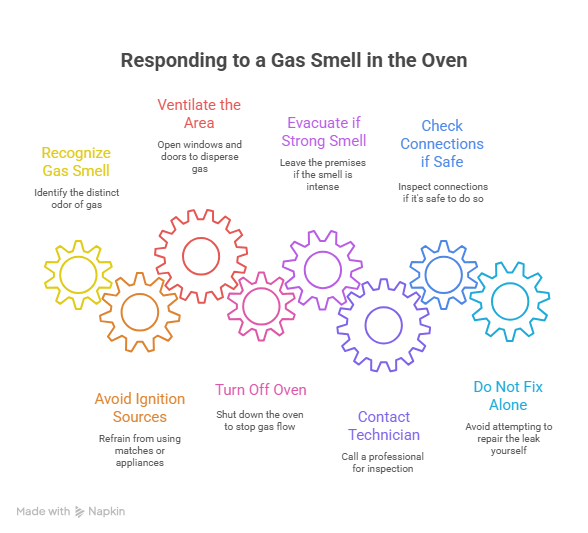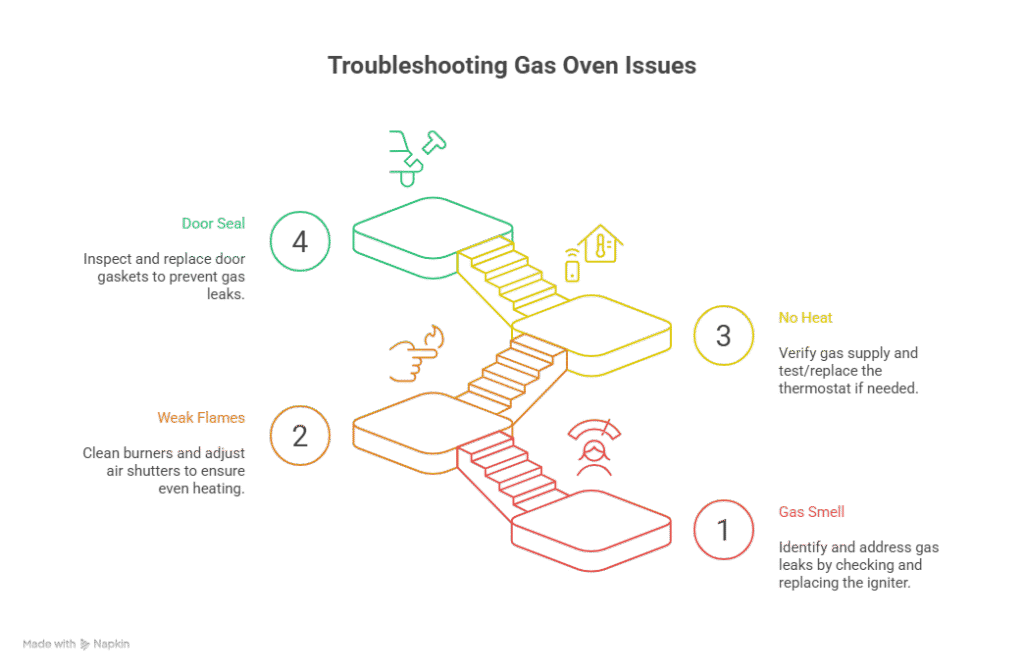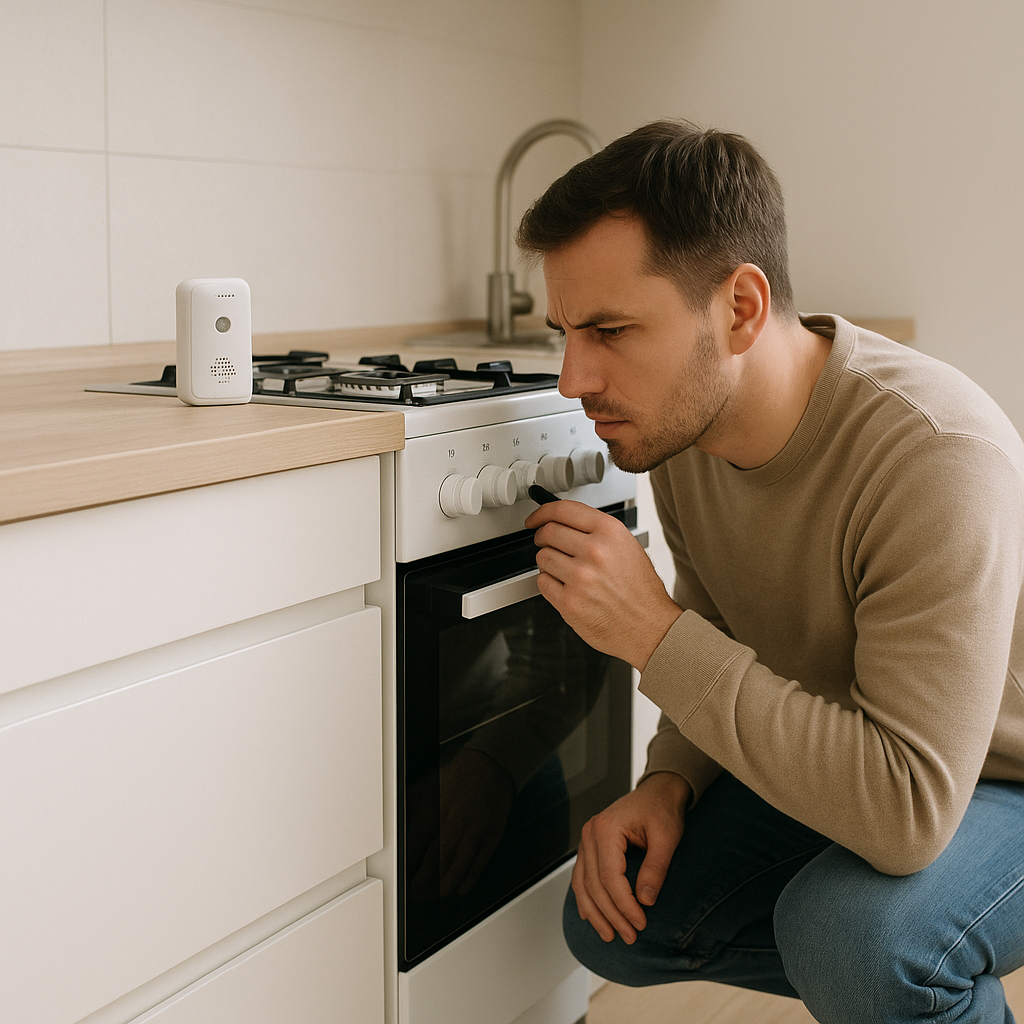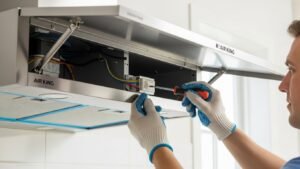Gas ovens are a staple in many kitchens, offering efficient cooking and baking. However, they can sometimes present issues that cause concern. One common problem is the smell of gas, which can be alarming. Understanding why your gas oven might emit this odor is crucial for safety. This guide will explore common gas oven problems and their solutions, ensuring your kitchen remains safe and functional. Whether you’re dealing with a new oven smell or a persistent gas odor, we’ll provide practical advice. Learn how to troubleshoot these issues and when to call a professional for help. Stay informed and keep your kitchen safe.
Is It Normal for a Gas Oven or Stove to Smell Like Gas?
A faint gas smell when starting your oven can be normal. This is due to unburned gas before the igniter lights it. However, a strong or persistent smell is not normal and should be addressed immediately.
If you smell gas, consider these possible causes:
- Loose gas connections
- Faulty igniter not burning off gas quickly
- Malfunctioning gas valve
Be aware that constant gas smells indicate a problem. In such cases, avoid using the oven. Ensure proper kitchen ventilation and call a professional to inspect your appliance. Remember, safety should always come first. If in doubt, trust your sense of smell and act swiftly to prevent accidents or health risks.

Common Gas Oven Problems and What Causes Them
Gas ovens, though efficient, can have various issues that may disrupt their performance. Identifying these problems early can save time and money. Let’s explore some common issues and their causes.
A frequent issue is the oven not heating properly. This can result from a faulty igniter or a broken thermostat. Both problems prevent the oven from reaching the desired temperature.
Uneven cooking is another problem caused by a malfunctioning burner assembly. This can lead to one side of the oven being hotter than the other, affecting cooking results.
A list of common problems includes:
- Oven not heating evenly
- Strange noises
- Igniter failure
- Oven door not sealing
Troubleshoot these issues promptly to ensure your oven operates safely. Often, these problems stem from wear and tear or lack of maintenance. Regular inspections and timely repairs can prevent these issues from becoming severe. Always consult a professional if you’re unsure how to fix an oven problem.
Oven Not Heating Up? Troubleshooting Tips & Solutions
Troubleshooting Gas Smells: What to Do If Your Oven Smells Like Gas
If your oven smells like gas, immediate action is required. Gas smells can indicate a potential leak, which poses serious health and safety risks. Recognizing the smell and knowing what steps to take can prevent accidents.
First, do not ignore the gas smell. Avoid lighting matches or turning on appliances. Gas is flammable, and even a small spark can trigger an explosion.
Next, ensure proper ventilation. Open windows and doors to disperse the gas. This will help reduce the concentration of gas in your kitchen.
Here are crucial steps to follow:
- Turn off the oven
- Ventilate the area
- Evacuate if the smell is strong
- Contact a technician
Check connections if you feel safe doing so. A loose connection can often be the culprit. Nonetheless, it is advisable to contact a professional to inspect your oven thoroughly.
In any case, never try to fix potential gas leaks on your own. Professional help ensures both your safety and the proper functioning of your gas oven.

Step-by-Step Solutions for Common Gas Oven Issues
Gas ovens are reliable, but issues can arise. Understanding the basics of troubleshooting can help you resolve common problems effectively.
1. Gas Smell When the Oven is On
A common issue is a gas smell when the oven is operating. This often points to a faulty igniter. Here’s how you can address it:
- Turn off the oven immediately.
- Check for visible damage to the igniter.
- If damaged, replace it with a new one.
- Ensure all connections are tight and secure.
2. Weak or Uneven Flames
Weak or uneven flames can affect cooking performance. Here’s what you can do:
- Clean the burners regularly.
- Check for any obstructions or blockages.
- Make sure the burner orifices are clear and not clogged.
- Adjust the air shutters if flames appear yellow.
3. The Oven Won’t Heat
If your oven won’t heat, it may indicate a problem with the thermostat or gas supply:
- Verify that the oven is connected to the gas supply.
- Test the thermostat by setting the oven to a specific temperature.
- If it doesn’t heat, the thermostat may need replacement.
4. Oven Door Seals Improperly
An improperly sealed door allows gas to escape. Take these steps:
- Inspect the door gasket for tears or wear.
- Replace it if necessary.
- Make sure the door latches securely when closed.
Routine checks and maintenance can prevent many issues. Always follow the manufacturer’s instructions for safety and efficiency. If ever in doubt, reaching out to a professional can save time and ensure proper repairs.

When to Worry: Gas Smell Safety and Emergency Steps
A gas smell shouldn’t be ignored. Being aware of when to act is crucial. If you notice a persistent smell, you may have a gas leak.
First, respond immediately to any strong odors. Leave the area and call emergency services. Don’t attempt to fix anything yourself. Safety is the priority in these situations.
Here are key steps to follow if you suspect a gas leak:
- Evacuate everyone from the premises immediately.
- Avoid using any electrical appliances, including switches.
- Contact your gas provider or emergency services once you are at a safe location.
- Ventilate the area if possible, using windows and doors.
Taking these precautions ensures you and your family remain safe.
Microwave Not Heating? Common Causes & Troubleshooting Tips
Preventing Gas Oven Problems: Maintenance and Safety Tips
Regular maintenance of your gas oven is essential for safety. Consistent checks help catch small issues before they become big problems. Proper care can extend the lifespan of your appliance too.
Start by inspecting connections and seals regularly. Look for any signs of wear or damage. Small cracks or loose fittings may indicate potential gas leaks.
Incorporate these tips into your routine maintenance:
- Clean burner assemblies and remove debris.
- Use soapy water to check for leaks around fittings.
- Ensure the oven door seal is intact and tight.
- Keep the area around the oven well-ventilated.
- Schedule a professional inspection annually.
Proactive maintenance keeps your gas oven running smoothly and safely. Prioritizing safety not only protects your family but also ensures peace of mind.
Frequently Asked Questions About Gas Oven Smells and Problems
Gas ovens often prompt questions from concerned users. One common query relates to whether it’s normal to detect a gas smell from a gas oven. Faint gas odors while preheating can be normal, but lingering scents require attention.
Many wonder about electric ovens emitting gas smells. This scenario typically signals a nearby gas appliance issue rather than the oven itself. Investigating nearby sources is key.
Common questions include:
- Why does my gas oven smell like gas only when preheating?
- Should I smell gas from my stove when it’s off?
- Is a gas smell from the oven dangerous?
Having clear answers ensures safe and efficient oven use. Understanding these issues can prevent emergencies and provide peace of mind.





